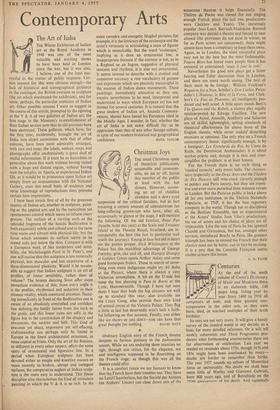Christmas Joys
THE usual Christmas spate of theatrical jollification, seasonable and unseason- able, on ice or off, leaves this member of the public at least with the hot shivers. However, assum- ing an air of childlike abandon and a dewy-eyed suspension of the critical faculties, but in fact retaining a certain amount of consideration for long-suffering grown-ups who have, after all, occasionally to glance at the stage, I will mention the following. Of the old familiar, Peter Pan (Janette Scott this year) at the Scala and Treasure Island at the Theatre Royal, Stratford, are in- comparably the best (the last in particular well worth the journey). Young in face but old at heart are the pantos proper. Dick Whittington at the Palace has the matchless advantage of George Formby, grin, uke and all, and Humpty Damply at Golders Green sports Arthur Askcy and some good homespun frolics. Those in search of some- thing even more indigenous might try Ali Baba at the Players, where there is always a cosy Victorian atmosphere. A bit on the U-side but none the less pleasing is Puss in Boots at the Lyric, Hammersmith. Though I have not seen them I hear that both the big circuses are well up to standard this year; also available are the Crazy Gang, who provide their own kind of annual circus at the Victoria Palace. They flag a little at last but deservedly won't lack a faith- ful following on that account. Finally, you either like ice shows or you don't—you can have that great thought for nothing. DAVID WAIT Ordinary English envy of the French. theatre deepens to furious jealousy in the pantomime season. While we are enduring these inanities we sigh, through our critics, for the elegance, wit and intelligence supposed to be flourishing on the French stage; as though this was all the theatre could offer.
It is a comfort (since we are human) to know that the French have their troubles too. They have no Lord Chamberlain, but the Societe des Auteurs (an Authors' Union) can close down any of the numerous theatres it helps financially. The Thane de Poche was closed for not staging enough French plays (its last two productions were Chekhov and Yeats). The immensely popular Jean-Louis Barrault-Madeleine Renaud company was denied a theatre and forced to tour abroad (the provinces do not exist in winter, so far as Paris actors are concerned); there might almost have been a conspiracy to keep them away. Again, as in London, the most successful plays may not be the best but the most fashionable; Pauvre Bitos has bored more people than it has annoyed or entertained, 'mais it faut le voir.'
Nevertheless the good new plays get a fairer hearing and fuller discussion than in London, and there are more worth seeing. The best of them seem to be foreign : William Faulkner's Requiem for a Nun, Schiller's Don Carlos, Piran- dello's L'Homme, le Bete et la Vertu, and Chek- hov's Ce Fou de Platonov, all intelligently pro- duced and well acted. A little apart stands Betti's The Queen and the Rebels, a clumsy play regally misinterpreted by Edwige Feuillere. The new plays of Ayme, Anouilh, Audiberti and Salacrou are all skilful lightweights, setting standards of theatrical effectiveness far above those of the English theatre, while never undult disturbing emotions or opinions. The only play on a French contemporary theme, significantly enough, is by a foreigner, Les Etendards du Roi, by Costa da Reals, the Dominican Ambassador; it is about worker-priests and, though it is thin and over- simplifies the problem, is at least honest.
For the French there is no such thing as 'musical comedy,' only music halls. The chanson- niers (especially at the Deux Anes and the Theatre de Dix Heures) still wise-crack cleverly enough at politics and Paris society, but they are repeti- tive and even more parochial than intimate revues in London. But the Parisian public is lucky above all for one institution; in the Theatre Nationale Populaire, or TNP, it has the best repertory company in the world. Though not as disciplined as the Berliner Ensemble, nor as experimental as the Actors' Studio, Jean Vilar's productions, his use of actors and his choice of plays are all impeccable. Like the rest of Paris he has ignored Claudel and Giraudoux, but has, amongst other services, introduced Brecht to Paris. His greatest triumph has been to remind the French that their classics need not be bores, can in fact be exciting. It is a pity that the Comedie Francaise seems unable to learn this lesson.
A. N. FAITH














































 Previous page
Previous page